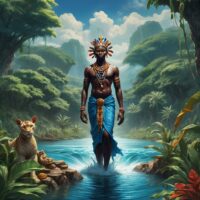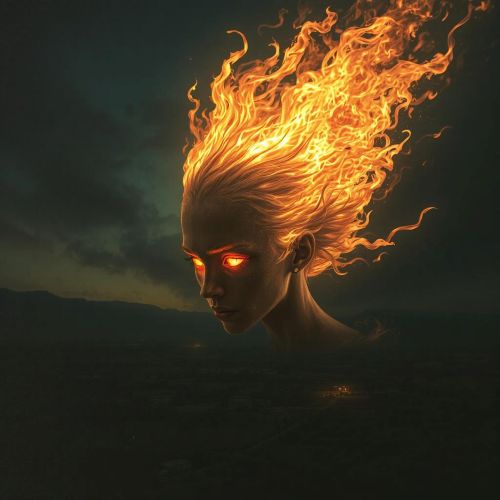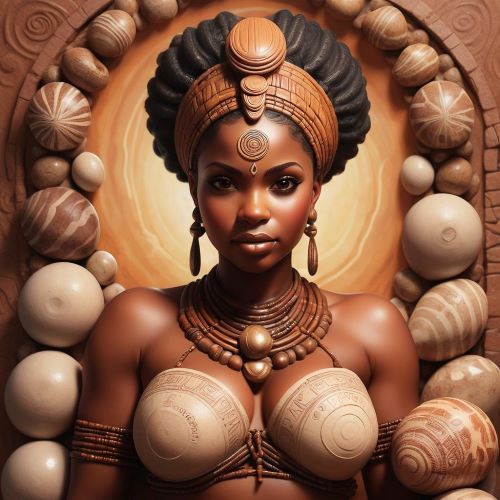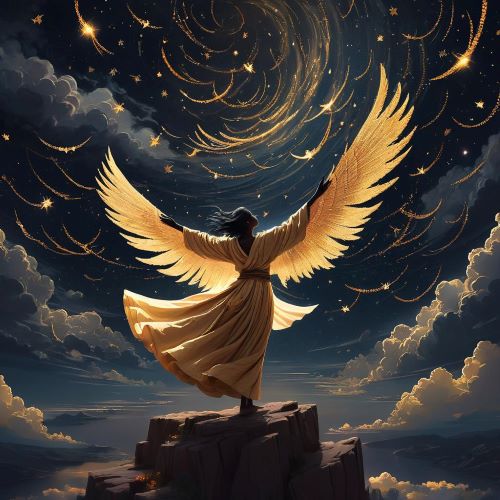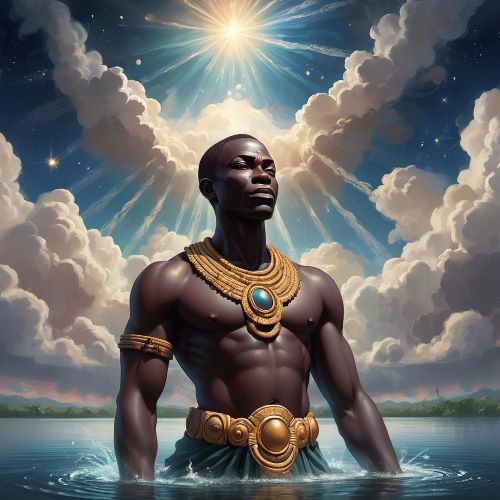Tano : The River God
Listen
At a glance
| Description | |
|---|---|
| Origin | West African Mythology |
| Classification | Gods |
| Family Members | Asase Yaa, Bia (Sisters), Nyame (Father) |
| Region | Ghana |
| Associated With | River Tano |
Tano
Introduction
Tano, also called Tano Kwesi, is a key figure in Akan and Ashanti mythology, known as the god of the Tano River, one of Ghana’s major waterways. As a powerful water spirit, Tano is deeply embedded in the spiritual and cultural practices of the Akan and Ashanti people, symbolizing the vital connection between humans and the natural world, particularly the life-giving force of water. In African mythology, Tano is not just a river but a sacred being with profound spiritual and cultural importance.
The river is personified and worshipped, playing a central role in the Akan people’s understanding of nature and spirituality. Tano is closely linked to agriculture, fertility, and the sustenance of life, with people often seeking his blessings for prosperity and fertility. His influence is evident in rituals, stories, and cultural traditions, making him a vital presence in the spiritual life of the Akan.
Physical Traits
In Akan mythology, Tano is a revered river deity, closely tied to the waters of the Tano River in the Ashanti region. Rather than focusing on a fixed physical form, Tano is often symbolized by the qualities of water—nurturing and life-giving, but also capable of destruction when angered. His presence in the river reflects the spiritual power attributed to flowing water.
The Tano River’s deep, clear waters are often symbolized by the color blue in ceremonies, representing purity and life, mirroring the essence of Tano. He is believed to have the ability to transform, which adds to his mystique and underscores his connection to the elemental force of water. Tano is also depicted as a figure of great majesty and power, sometimes imagined as a wise elder, embodying authority and wisdom. He is associated with aquatic life, such as fish and water lilies, emphasizing his rule over the river and its ecosystem. In artistic depictions, he may be shown wearing flowing robes and holding a staff, symbolizing his divine and kingly status.
Family
Tano is an important figure in Akan mythology and is often seen as part of a broader pantheon of deities. He is sometimes described as a son of Nyame, the supreme creator god who oversees the universe. Nyame’s influence is present in the reverence given to Tano, highlighting the interconnectedness of all divine forces in Akan cosmology. Tano is linked to other river and natural deities, forming a spiritual network that reflects the Akan people’s deep connection to nature.
Tano is also considered a brother to other water spirits and is sometimes associated with ancestral spirits, which play key roles in maintaining the balance between the natural and spiritual worlds. This divine family of deities, which includes figures like Asase Yaa, the earth goddess, and Bia, another river god, represents the close relationship between natural elements and spiritual forces. This interconnectedness is a central theme in Akan spirituality, emphasizing the harmonious yet dynamic nature of the universe.
Other names
In Akan tradition, Tano is known by various names that emphasize his roles and characteristics. While “Tano” refers to the river itself, “Abosom” is a general term for deities. In certain contexts, he is called “Tano Nyame,” indicating a close connection to spiritual authority. Other names such as Tano Kwesi highlight his importance as a powerful deity, while Bosomtwe Tano emphasizes his association with Lake Bosomtwe, a sacred body of water in Ghana. The name Taa Kora reflects his multifaceted nature and regional variations, showcasing the diverse perceptions of Tano across different Akan-speaking communities.
These alternative names illustrate the widespread veneration of Tano, each emphasizing different aspects of his identity and significance. Additionally, localized names may differ among various Akan groups, highlighting the rich diversity within Akan religions. This multiplicity underscores the flexibility of mythological narratives, allowing them to adapt to various historical and cultural contexts while preserving the core attributes associated with Tano. As a result, Tano remains a vital figure within the spiritual landscape of the Akan people, symbolizing their deep connection to nature and the divine.
Powers and Abilities
Tano holds a significant place in Akan spirituality, endowed with various powers that underscore his role as a provider of fertility and abundance. He is essential to agricultural practices, with rituals dedicated to him often aimed at securing blessings for crops and livestock, which are vital for the community’s survival. The deity is also associated with healing and protection, as water is widely recognized for its purifying qualities, and Tano embodies this essence. Ceremonies at the river typically involve offerings, emphasizing the reciprocal bond between humans and the divine, where libations, sacrifices, and prayers are made to invoke Tano’s favor and goodwill.
Tano’s nature is complex; he is both nurturing and destructive. Local folklore recounts stories of his wrath, warning that neglect or disrespect toward the river can result in natural disasters or poor harvests, highlighting the importance of maintaining balance in the relationship between humans and nature. As the god of the Tano River, Tano wields significant authority over water and its life-giving properties, ensuring the land’s fertility and the prosperity of those who rely on the river. His powers extend into the spiritual realm, as he is often called upon during rituals for guidance and blessings in various life aspects. Tano is also viewed as a guardian of moral order, reinforcing justice and integrity within the community.
Modern Day Influence
In contemporary Ghana, Tano remains a significant figure in the cultural life of the Ashanti and other Akan communities. Traditional festivals dedicated to Tano celebrate the river’s vital role in agriculture and community well-being. These events not only showcase cultural heritage but also provide a platform for reconnecting with ancestral traditions and strengthening community ties. The reverence for Tano has become a focal point for cultural expression, bringing people together to honor their shared history and beliefs.
Tano’s influence extends into modern environmental activism, where traditional knowledge emphasizes the need to protect natural water sources. This recognition of the Tano River’s spiritual and ecological importance has led to initiatives aimed at preserving its ecosystem. Additionally, Tano has inspired artistic expressions across literature, music, and visual arts, cementing his place in the cultural consciousness of both the Akan people and a wider audience interested in African mythology. Despite the growth of Christianity and other religions, the worship of Tano remains a vital aspect of modern Akan culture. Traditional rituals and ceremonies continue to be practiced, particularly among communities near the river, where offerings are made to seek blessings of prosperity and protection. This enduring connection with Tano highlights the importance of maintaining harmony with the natural world while celebrating cultural heritage.
Related Images
Frequently Asked Questions
What is lorem Ipsum?
I am text block. Click edit button to change this text. Lorem ipsum dolor sit amet, consectetur adipiscing elit. Ut elit tellus, luctus nec ullamcorper mattis, pulvinar dapibus leo.
What is lorem Ipsum?
I am text block. Click edit button to change this text. Lorem ipsum dolor sit amet, consectetur adipiscing elit. Ut elit tellus, luctus nec ullamcorper mattis, pulvinar dapibus leo.
What is lorem Ipsum?
I am text block. Click edit button to change this text. Lorem ipsum dolor sit amet, consectetur adipiscing elit. Ut elit tellus, luctus nec ullamcorper mattis, pulvinar dapibus leo.
What is lorem Ipsum?
I am text block. Click edit button to change this text. Lorem ipsum dolor sit amet, consectetur adipiscing elit. Ut elit tellus, luctus nec ullamcorper mattis, pulvinar dapibus leo.
What is lorem Ipsum?
I am text block. Click edit button to change this text. Lorem ipsum dolor sit amet, consectetur adipiscing elit. Ut elit tellus, luctus nec ullamcorper mattis, pulvinar dapibus leo.
Watch
Source
Meyerowitz, Eva L. R. The Sacred State of the Akan. Faber and Faber, 1951.
Rattray, R. Sutherland. Ashanti. Clarendon Press, 1923.
Smith, W. Pietz. The Akan Doctrine of God: A Fragment of Gold Coast Ethics and Religion. Dawsons of Pall Mall, 1969.
Boateng, Boatema. “The Role of Water Spirits in Akan Religion and Culture.” Journal of African Cultural Studies, vol. 12, no. 2, 2000, pp. 245-263.
“Akan Religion and the Significance of the Tano River.” Ghanaian Myths and Legends, 2023. https://ghanamyths.org/akan-religion-tano
“The Tano River: Sacred Waterways of the Akan.” African Folklore Review, 2022. https://africanfolklorereview.com/tano-river
“Tano Kwesi: The God of the Tano River.” Encyclopedia of African Mythology, 2018. https://africanmythology.org/tano-kwesi
Busia, A. W. (1994). “The Ashanti: A History of the Ashanti Empire.” Oxford University Press.
McCarthy, S. (2018). “African Spirituality: Forms, Meanings, and Expressions.” African Books Collective.
Osei, A. (2012). “Rituals of the Akan: A Cultural Heritage.” Ghana University Press.
Tadjo, V. (2011). “Of Saviors, Gods and Domination: The Rise and Fall of Laurent Gbagbo.” Africa World Press.

